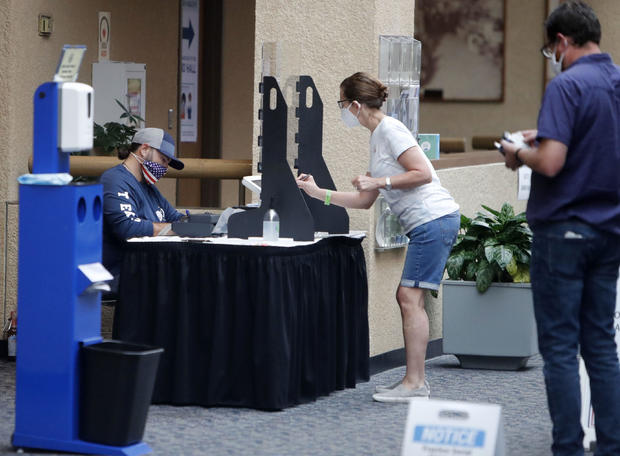Voters in Texas are going to the polls Tuesday for runoffs in a high-profile Senate race and 15 House districts. Tuesday’s elections come as the state grapples with the growing numbers of coronavirus cases and hospitalizations, leading to an effort to expand mail-in voting that was eventually quashed.
Despite increasing coronavirus cases, early turnout for a runoff election is high. According to data from the Secretary of State’s office, more than 1 million people voted early. Close to 700,000 Democrats showed up in part to cast their vote for a Democratic Senate nominee.
Democrats are choosing between Air Force veteran MJ Hegar or state Senator Royce West to take on three-term Republican Senator John Cornyn in November. After none of the 12 candidates achieved 50% in March, the top two, Hegar and West, advanced to the runoff.
Hegar has received the endorsement of the Democratic Senatorial Campaign Committee and has led West in fundraising throughout the cycle. West, who has served almost three decades in the state Senate, has touted his experience and criticized Hegar’s credentials as a Democrat to tighten the race. Cornyn capitalized on that with an ad last week propping West up as a “liberal Democrat” in an effort to boost West’s candidacy ahead of the runoff.
According to the latest CBS News Battleground Tracker, Cornyn leads both potential candidates in a general election match-up, but 15% of likely voters in each match-up are not sure who they will support so there will be movement in the four months ahead of Election Day. And for the first time in decades, Texas appears to be in play for Democrats in the 2020 presidential race, with the CBS News Battleground Tracker showing just a 1-point edge for President Trump.
Texas has become a recent hotspot for COVID-19, seeing a high of more than 10,000 new cases on July 7. Even before the resurgence, Democrats launched multiple efforts to expand who can vote by mail. Their attempts fell short at the state’s Supreme Court and a petition still remains at the U.S. Supreme Court, who said they would not accelerate the process for the runoff.
In response to recent spikes, Republican Governor Greg Abbott issued a statewide mask mandate earlier this month, and was quickly censured by eight Republican county committees because of it. However, he exempted runoff voters and workers from his executive order.
“We don’t want to deny somebody the ability to go vote simply because they don’t have a mask,” he said in an early July press conference.
At least two Democratic poll workers have left because Republican workers didn’t want to wear masks, according to Rose Clouston, the protection director of the Texas Democratic Party Voter, which provides workers during the primary and runoffs.
“They left because they didn’t feel like they could safely work in that space all day,” Clouston told CBS News. She said that while trying to recruit poll workers, people who normally work the elections are more timid.
“People who normally work have been saying, you know, I’m here for this election and I support everything we’re doing and I want to be there so badly,” she said. “But, you know, I have been quarantining for three months and, you know, I live with an elderly person or I myself am at risk and I just can’t take on that risk of being at a polling place for 14 hours and being exposed to other people, other voters and other election workers in that way.”
One worker, 59-year-old Cynthia Riley, said she left her polling location in Plano, Texas just before polls were set to open. She said she didn’t feel comfortable sitting next to people not wearing masks for 14 hours. “For me to be expected for $12 an hour to sit there next to a bunch of yahoo’s who can’t do the most basic thing; wear a mask. It’s not worth it,” Riley told CBS News. “I know if they can’t even put a mask on they’re not doing anything else. Lord knows where they’ve been.”
Texas Democrats communications director Abhi Rahman told CBS News the state’s Republican leadership has “basically made people have to risk their health in order to go out to vote” by not expanding the mail vote.
“What we’re seeing still is that Democrats are willing to do that, they’re willing to stand up and say, ‘Enough is enough,'” Rahman said. “You can always tell a movement is happening when there’s obstacles thrown your way and people are still trying to get to the ballot box.”
House campaigns in runoffs said they weren’t sure what to expect from in-person turnout, but all pointed to a consistent streak of early voting. Early voting and counted mail ballots have accounted for about 6.5% in turnout so far, a number that’s already higher than usual, according to Cal Jillson, a professor at Southern Methodist University in Texas.
“Runoff elections are low-turnout events. They tend to be sort of 5% of registered voters. This may be up in the range of 8. High for for a runoff election, but still a modest number of voters overall,” Jillson told CBS News. “The broader thing is that people are feeling vulnerable, exposed and uncertain. And while this is not going to change anything, it’s something they can do.”
The two main House Democratic primaries to watch take place in the suburbs and outskirts of Houston and Dallas. In Texas’ 10th district, former Austin city attorney Mike Siegel has continued the progressive streak from his 2018 run, garnering support from the Sunrise Movement, Congressional Progressive Caucus vice chair Ro Khanna and Senators Bernie Sanders and Elizabeth Warren.
He’s facing Dr. Pritesh Gandhi, a more moderate-leaning candidate who has drawn contrasts with Siegel over healthcare policy (like Sanders, Siegel is an advocate for Medicare for All), and argues he’s more electable in November against Republican incumbent Michael McCaul.
Siegel has also been endorsed by retired Air Force Colonel Kim Olson, who is currently locked in her own runoff in Texas’ 24th district. Unlike Siegel, Olson is facing a challenge from the left with local school board member Candace Valenzuela.
Valenzuela is backed by a roster of former presidential candidates: Secretary Julián Castro and Senators Warren, Kamala Harris and Cory Booker. Olson came first in the March 3 primary, winning 41% of the vote and campaign emails often label her as the “Democratic frontrunner.”
The winner will go on to face Republican Beth Van Duyne for the Dallas-area seat, left open by retiring Republican Congressman Kenny Marchant. Another open seat is in Texas’ 23rd, formerly held by Congressman Will Hurd, where two Republicans are duking it out to take on Democrat Gina Ortiz Jones in November. Ortiz Jones came within 1,000 votes of Hurd in the battleground district in 2018.
National Republicans are split between backing Tony Gonzales and Raul Reyes Jr. in that race. Senator Ted Cruz endorsed Reyes Jr. in late June, complete with a six-figure ad buy. Mr. Trump endorsed Gonzales shortly after Cruz backed Reyes Jr. And Republican leadership, House Minority Leader Kevin McCarthy and Whip Steve Scalise, have backed Gonzales.
The Trump campaign had to send Reyes Jr. a cease-and-desist letter over a mailer using the president’s image, claiming it’s “misleading, and possibly unethical.” This massive border district that spans from El Paso to San Antonio was one of 14 Texas Congressional districts Mr. Trump lost in 2016, with Hillary Clinton winning it by 3 points.
Near Houston, Sheriff Troy Nehls and businesswoman Kathaleen Wall are in a runoff for the Republican nomination in the 22nd district. Wall has spent more than $8 million on her campaign, running ads on everything from blaming China for the spread of the Coronavirus to attempts to tie Nehls’ to sex trafficking in the state, something he has called “an ABSOLUTE LIE.”
All four of these districts have been targeted by local and national Democrats, who have looked to capitalize on the state’s changing demographics. On Tuesday, Biden’s campaign expanded its ad buy to include airing spots in Texas– the first time the campaign has waded into the state.
In Texas’ 17th district, former Congressman Pete Sessions is eyeing a return to Congress. He’ll first have to try and beat Renee Swann, who has been endorsed by outgoing Congressman Bill Flores. Sessions previously represented the 32nd district, but was ousted by Democrat Colin Allred in 2018. He has touted his experience in Congress as his main argument, claiming he’d be able to regain his committee assignments.
“I think the experience argument rings pretty hollow,” Flores told CBS News. “At the end of the day it goes back to what do people in this district want? And they want a citizen legislator, not a career politician.”
Another runoff in a safe Republican seat has garnered the attention of Mr. Trump, who often touts his record on Republican Congressional endorsements.
In Texas’ 13th district, Dr. Ronny Jackson, the former White House physician, is facing off against Josh Winegarner, a former lobbyist for the Texas Cattle Feeders Association. Jackson has been endorsed by the president, while Winegarner has received the support of outgoing Congressman Mac Thornberry.
“Ronny’s a great gentleman… the kind that can help me A LOT in Washington. He will be a special, special Congressman and he will never let you down,” Trump said during a telethon town hall for Jackson on Monday.
Adam Brewster & Cara Korte contributed reporting.



















